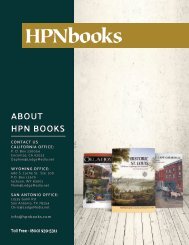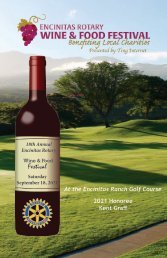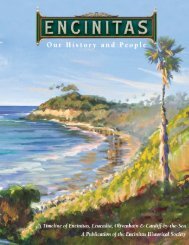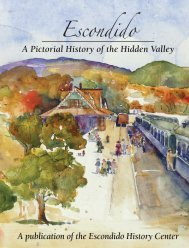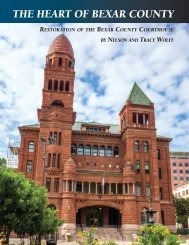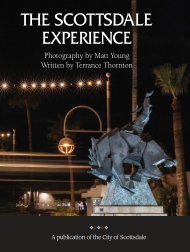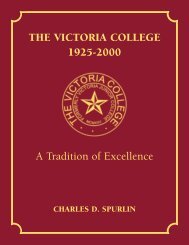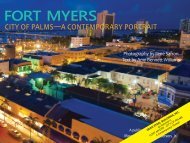Notable New Orleanians: A Tricentennial Tribute
An illustrated history of New Orleans paired with the histories of companies that have helped shape the city.
An illustrated history of New Orleans paired with the histories of companies that have helped shape the city.
You also want an ePaper? Increase the reach of your titles
YUMPU automatically turns print PDFs into web optimized ePapers that Google loves.
O SCAR<br />
J. DUNN<br />
(1826-1871)<br />
<br />
Oscar Dunn.<br />
THE HISTORIC NEW ORLEANS COLLECTION, 1970.11.155.<br />
Oscar J. Dunn combined a background in private business with scrupulous honesty<br />
to meet the challenge of navigating Reconstruction in Louisiana. He set an example for<br />
the newly emerging African-American leadership. His most prominent work fell in the<br />
period from 1866 until his premature death in 1871, when as the state’s lieutenant governor<br />
he was poised to become governor. On November 20, 1871, he suddenly fell ill and died two<br />
days later.<br />
Dunn’s family had worked for successful pre-war businessman James Caldwell (q.v.), who,<br />
in 1819, had freed Dunn’s father James. James Dunn subsequently purchased the freedom of<br />
his wife Marie and their two children, Oscar and Jane. James Dunn’s father had been a valued<br />
carpenter for Caldwell during the construction of the St. Charles Theatre in <strong>New</strong> Orleans.<br />
Oscar Dunn subsequently joined his father’s trade as a plasterer. But he was also able to<br />
become a popular violinist and taught lessons with the instrument. During the 1850s Dunn<br />
joined the Prince Hall Freemasons and rose rapidly as Master and Grand Master of Richmond<br />
Lodge No. 4. The lodge, founded in 1850, was an offshoot of the St. James A.M.E. Church. 1<br />
Dunn did not volunteer for either side of the Civil War. But, towards the end he saw that<br />
the new Freedmen’s Bureau needed administrative help. He opened an employment agency<br />
that found positions for the former slaves. Joining the Advisory Committee of the Freedmen’s<br />
Saving and Trust Company of <strong>New</strong> Orleans, a private company, he was selected its secretary.<br />
At the same time he launched the Louisiana Association of Workingmen’s People’s Bakery.<br />
Dunn’s comparatively short political career began with an appointment to the <strong>New</strong><br />
Orleans City Council in 1867. In 1868, he ran successfully for lieutenant governor on the<br />
ticket of Henry Clay Warmouth. Dunn then served until his death in 1871. His honesty was sufficiently<br />
tested as he was head of the Metropolitan Police and the state Printing Committee, both of<br />
which had million dollar budgets, and the board of Straight University.<br />
Dunn’s alliance with Warmouth unraveled as Dunn joined the “Federal” or “Custom House” faction<br />
of the Republican party, led by Stephen B. Packard. <strong>New</strong> U. S. Senator William Pitt Kellogg<br />
also followed Packard and Dunn, all of them finding Warmouth too close to the Democrats. In this<br />
political situation Dunn was poised for higher office, except for his premature death.<br />
See Joseph A. Walkes Jr. Jno G. Lewis, Jr.—End of an Era: the History of the Prince Hall Grand Lodge of Louisiana, 1842-<br />
1979. Leavenworth, Kan.: J.A. Walkes, Jr., c1986.<br />
<br />
L OUIS M OREAU G OTTSCHALK<br />
(1829-1869)<br />
American composer Louis Moreau Gottschalk never abandoned his <strong>New</strong> Orleans roots, and<br />
<strong>New</strong> Orleans music has never abandoned him. Gottschalk’s compositions—celebrated in France,<br />
Brazil, and California—demonstrated a distinct, home-based rhythm that spread through the late<br />
nineteenth and twentieth century world of popular music. <strong>New</strong> Orleans composers who followed<br />
him owed his music a considerable debt. Biographer S. Frederick Starr wrote “No ragtime composer<br />
exploited [Gottschalk’s]Caribbean and Creole syncopated rhythms more thoroughly than [did]<br />
Jelly Roll Morton….” 1 The French-speaking population of <strong>New</strong> Orleans played Gottschalk’s works<br />
regularly, notably Gottschalk’s piano music based on the great operas of the time. “Jelly Roll prided<br />
himself on his ability to “rag” the Miserere from Il Trovatore, which he almost certainly learned<br />
from Gottschalk’s transcription.” 2<br />
NOTABLE NEW ORLEANIANS: A <strong>Tricentennial</strong> <strong>Tribute</strong><br />
78





